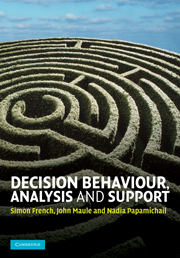Book contents
- Frontmatter
- Contents
- List of figures
- List of tables
- List of case vignettes
- List of abbreviations and notation
- Preface
- Acknowledgements
- Dedication
- 1 Introduction
- 2 Behavioural decision studies
- 3 Decision analysis and support
- 4 Information and knowledge management
- 5 Artificial intelligence and expert systems
- 6 Operational research and optimisation
- 7 Decision analysis and multiple objectives
- 8 Decision analysis and uncertainty
- 9 Issue formulation and problem structuring
- 10 Strategic decision analysis
- 11 Groups of decision makers
- 12 Organisational decision support
- 13 Societal decision making
- 14 Decision support systems
- 15 Conclusions
- References
- Index
Preface
Published online by Cambridge University Press: 20 February 2010
- Frontmatter
- Contents
- List of figures
- List of tables
- List of case vignettes
- List of abbreviations and notation
- Preface
- Acknowledgements
- Dedication
- 1 Introduction
- 2 Behavioural decision studies
- 3 Decision analysis and support
- 4 Information and knowledge management
- 5 Artificial intelligence and expert systems
- 6 Operational research and optimisation
- 7 Decision analysis and multiple objectives
- 8 Decision analysis and uncertainty
- 9 Issue formulation and problem structuring
- 10 Strategic decision analysis
- 11 Groups of decision makers
- 12 Organisational decision support
- 13 Societal decision making
- 14 Decision support systems
- 15 Conclusions
- References
- Index
Summary
An article by Ian Ayres in the Financial Times Magazine of 1 September 2007 begins:
How can a mathematical formula outperform a wine connoisseur? Or predict how the US Supreme Court will vote more accurately than a panel of legal experts? The answer lies partly in the overconfidence of humans and partly in the fast improving powers of database analysis.
In many ways these sentences chart the course we shall be steering in exploring decision making: how we do it and how we could do it better. Many behavioural studies have shown that, while we humans may be the best decision makers on the planet, we are not as good as we think we are. We are subject to biases, inconsistencies and – dare we say it? – irrationalities in our decision making. We could do better. Therefore, it is not surprising, perhaps, that computers bringing advanced forecasting algorithms to bear on vast modern databases that bulge with fact upon fact are able to outperform even the best experts in highly structured forecasting tasks.
Of course, this is not to suggest that computers are more intelligent than humans (we designed and programmed them, after all!), just that they are more consistent, able to keep more facts ‘in mind’ and less likely to be distracted by some outlying fact that runs against the broad thrust of evidence or, worse, some personal pet theory. They are not prone to overconfidence. Experts tend not to notice their failures. They fail to moderate their future predictions with the humility of their past inaccuracies.
- Type
- Chapter
- Information
- Decision Behaviour, Analysis and Support , pp. xxiii - xxviPublisher: Cambridge University PressPrint publication year: 2009

